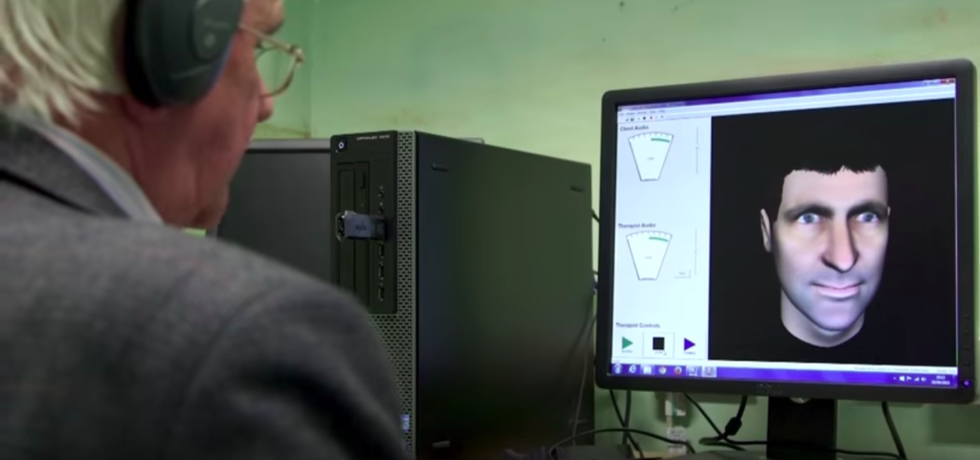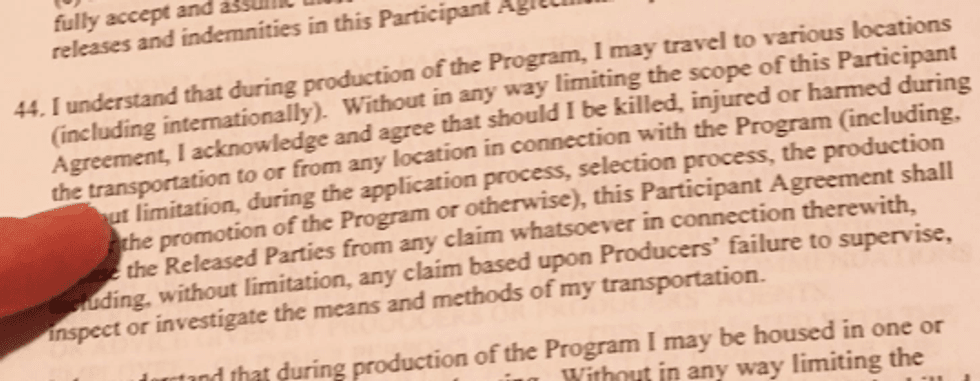There are more than 21 million people suffering from schizophrenia worldwide. Most commonly associated with hearing hallucinatory voices that threaten and insult, schizophrenia can affect people’s ability to maintain employment or healthy relationships. With 25 percent of symptoms being resistant to traditional therapies, a promising study found people with this condition can reduce or even eliminate their symptoms by talking back to an avatar designed to mimic the voices in their head.
Avatar Therapy
Researchers from King’s College in the UK conducted the first large scale study using avatars to help people with schizophrenia overcome the power of voices in their head. This “avatar therapy”—invented by Prof Julian Leff, from University College London in 2008—uses a computer program to allow patients to design faces for these voices, including details such as race, face shape, skin color, eyebrows, etc. During the session, the therapist sits in another room and uses software to speak, mimicking the voice as indicated by the patient.
During the trial, which lasted 10-15 minutes for six weeks, the voices spewed insults and abuse at the patients such as, “You’re rubbish. You’re rubbish. You’re a waste of space.” The therapists played a dual role, encouraging patients to confront their avatars assertively by saying, “go away,” or by ignoring them. As the patients’ responses became more forceful, gradually the avatar would begin to yield and praise the patients’ positive qualities.
Lead author Tom Craig, professor at King’s College London, explained that “The whole experience changes from something that’s very frightening to something that’s much more in the person’s control.”
For instance, in one video, a subject first asked the avatar: "Can you go away, please?”
Craig offered support, and said, "That's good …, that's good, but can you try and make it a bit stronger for me? Sit up, look at him, and tell him to go away, OK?"
Later, bolstered by the process and the support of the therapist, the subject asserted: "I am not going to listen to you anymore!" Through the therapy, the patients increased their self-esteem.
The 150 patients involved in the study had suffered from hallucinations between 1 and 20 years. Their symptoms had been resistant to conventional therapies such as antipsychotic medication and counseling. The patients in the trial heard an average of three to four voices. All patients continued their medications during the study, but a control group of 75 received a specially designed therapy, while the other 75 participated in the avatar therapy.
In addition to the weekly therapy sessions, those in the control group who received supportive counseling recorded a positive message to listen to in the following week. The avatar therapy patients received an audio recording of each session to listen to at home when they heard voices.
"It's not for everyone," according to Craig. "Some people find it a bit too frightening to take the therapy on board." He explained, "You can't have a dialogue or a conversation with a disembodied voice."
He compared the avatar therapy to a video game—“real” enough to get patients engaged "but modified enough to make it as safe as possible." Craig said, "You can challenge that (avatar) much more than you can a voice that's just in the air somewhere," adding that "[t]he face makes it work."
Rapid Results of Avatar Study
Researchers found patients who received avatar treatment felt the voices became less “omnipotent.”
Craig said, "With a talking head, patients are learning to confront and get replies from it.” He added, "This shifts the idea that the voice is all-controlling."
Paul Grant, an assistant professor at the University of Pennsylvania's Perelman School of Medicine who was not involved in the study, but develops CBT for people with schizophrenia said: "It's essentially a rescripting ... of the way that the person responds" to voices they hear.
According to one participant in the avatar therapy, "It was like talking to a part of myself." This former attorney would often hear the voice of judges, and described it “like a living nightmare.” However, he said that talking to his avatar helped “wake him up.”
Craig described the findings in the avatar group as containing "really large and significant decreases in the amount of distress people felt in relation to their voices, the number of times a day they heard the voices, and the extent to which they felt overpowered by the voice."
After 12 weeks of avatar therapy, seven people reported their voices had stopped altogether, compared to only two receiving counseling. These rapid improvements in the avatar therapy group were sustained at 24 weeks. However, the counseling group showed equal improvement by 24 weeks, demonstrating itself as a potentially useful—if slower paced—therapy.
As Craig explained, “Our study provides early evidence that avatar therapy rapidly improves auditory hallucinations for people with schizophrenia, reducing their frequency and how distressing they are, compared to a type of counselling.”
Thus, one substantial benefit of avatar therapy rests in its potential to speed up patients’ ability to reduce their distress from the hallucinatory voices, or even halt them altogether.
"A large proportion of people with schizophrenia continue to experience distressing voices despite lengthy treatment, so it is important that we look at newer, effective and shorter forms of therapy," according to Craig.
For instance, cognitive behavioral therapy for psychosis (CBTp) is one treatment used for schizophrenia, but the frequent length and limited effect on the hallucinatory voices renders it less than ideal.
Experts Weigh in on Avatar Therapy’s Future
The results of this study reveal the need for further testing, and raises a number of specific suggestions and concerns. One proposal by the researchers would require booster sessions for the avatar therapy based on the fact that both groups improved equally by 24 weeks. The study also notes that further research should determine whether the mental health system could deliver the therapy on a wide scale, given that the trial’s therapists were specially trained and experienced in psychosis.
In Craig’s opinion, however, "there's nothing in the therapy that I feel couldn't be delivered by someone much earlier on in the course of their career."
A cost-effectiveness analysis is also planned because, as Craig explained, it's "not a cheap therapy at this stage.”
Overall, Craig said, “these results come from one treatment centre and more research is needed to optimise the way the treatment is delivered and demonstrate that it is effective in other NHS settings."
Another question arising from the study is what long-term implications will occur from the symptom reduction. Craig explained the study was too small and short to show significant life changes.
Grant questions how avatar therapy will compare to other treatments, who will benefit from it, and whether low tech options would work equally well.
For instance, "You could do the same thing low-tech if you role-play the voice," Grant said.
So far, the primary benefit of avatar therapy indicated by the study is the speed at which symptoms are reduced or eradicated. If further validated, avatar therapy could reduce the backlog on the public health system and work within larger treatment plans to increase the overall improvement of patient care and mental health.
"Avatar therapy is a promising new approach and these early results are very encouraging," according to Ann Mills-Duggan of the Wellcome Trust, which provided funding for the trial. "If the researchers can show that this therapy can be delivered effectively by different therapists in different locations, this approach could radically change how millions of psychosis sufferers are treated across the world."
Craig is confident that with more study, avatar therapy will be a new piece of treatment for schizophrenia.
"Antipsychotic medication is helpful to a point, but many people who have been on antipsychotic medicine for years and years still have their voices," he explained. "I think it's a real advance, and I think there will come a time when this will be part of routine provision of psychological treatments for voice-hearers in psychosis."








 reply to @milano_alyssa/Instagram
reply to @milano_alyssa/Instagram reply to @rebeccagayheartdame/Instagram
reply to @rebeccagayheartdame/Instagram reply to @milano_alyssa/Instagram
reply to @milano_alyssa/Instagram reply to @milano_alyssa/Instagram
reply to @milano_alyssa/Instagram reply to @milano_alyssa/Instagram
reply to @milano_alyssa/Instagram reply to @milano_alyssa/Instagram
reply to @milano_alyssa/Instagram reply to @milano_alyssa/Instagram
reply to @milano_alyssa/Instagram reply to @milano_alyssa/Instagram
reply to @milano_alyssa/Instagram reply to @milano_alyssa/Instagram
reply to @milano_alyssa/Instagram reply to @milano_alyssa/Instagram
reply to @milano_alyssa/Instagram reply to @milano_alyssa/Instagram
reply to @milano_alyssa/Instagram reply to @milano_alyssa/Instagram
reply to @milano_alyssa/Instagram reply to @milano_alyssa/Instagram
reply to @milano_alyssa/Instagram reply to @milano_alyssa/Instagram
reply to @milano_alyssa/Instagram reply to @milano_alyssa/Instagram
reply to @milano_alyssa/Instagram reply to @milano_alyssa/Instagram
reply to @milano_alyssa/Instagram reply to @milano_alyssa/Instagram
reply to @milano_alyssa/Instagram reply to @milano_alyssa/Instagram
reply to @milano_alyssa/Instagram reply to @milano_alyssa/Instagram
reply to @milano_alyssa/Instagram





 @realDonaldTrump/Truth Social
@realDonaldTrump/Truth Social

 @gutterutterart/Instagram
@gutterutterart/Instagram @gutterutterart/Instagram
@gutterutterart/Instagram @gutterutterart/Instagram
@gutterutterart/Instagram @gutterutterart/Instagram
@gutterutterart/Instagram @gutterutterart/Instagram
@gutterutterart/Instagram @gutterutterart/Instagram
@gutterutterart/Instagram @gutterutterart/Instagram
@gutterutterart/Instagram @gutterutterart/Instagram
@gutterutterart/Instagram @gutterutterart/Instagram
@gutterutterart/Instagram @gutterutterart/Instagram
@gutterutterart/Instagram @gutterutterart/Instagram
@gutterutterart/Instagram